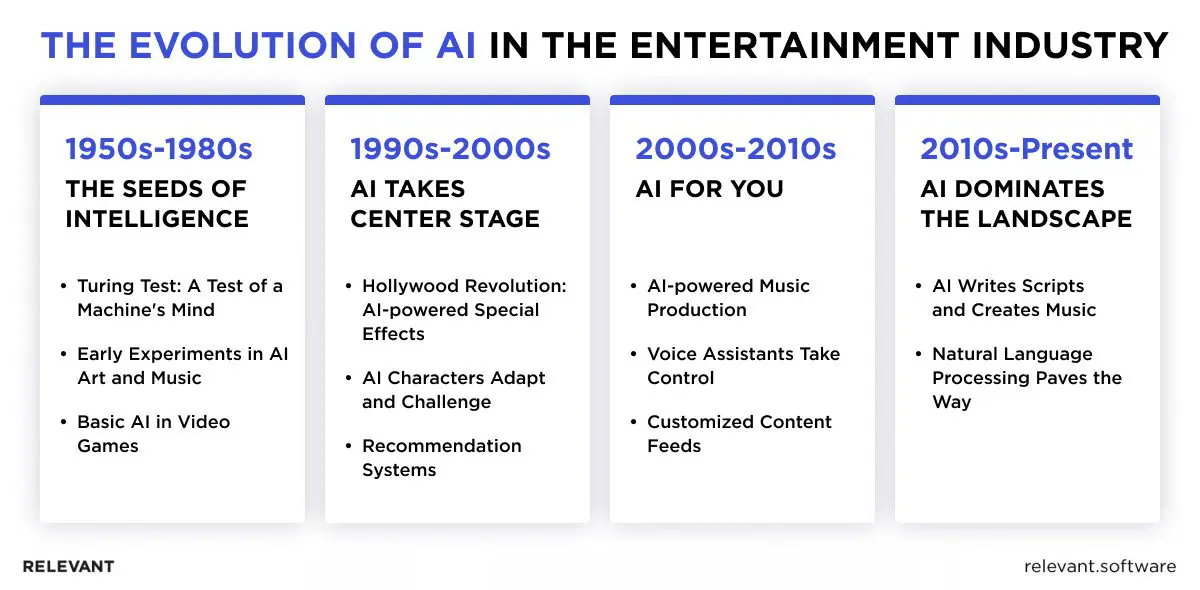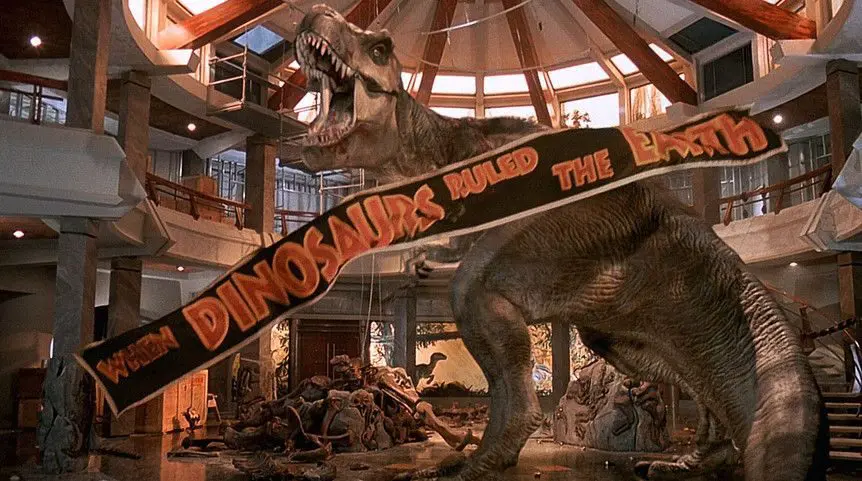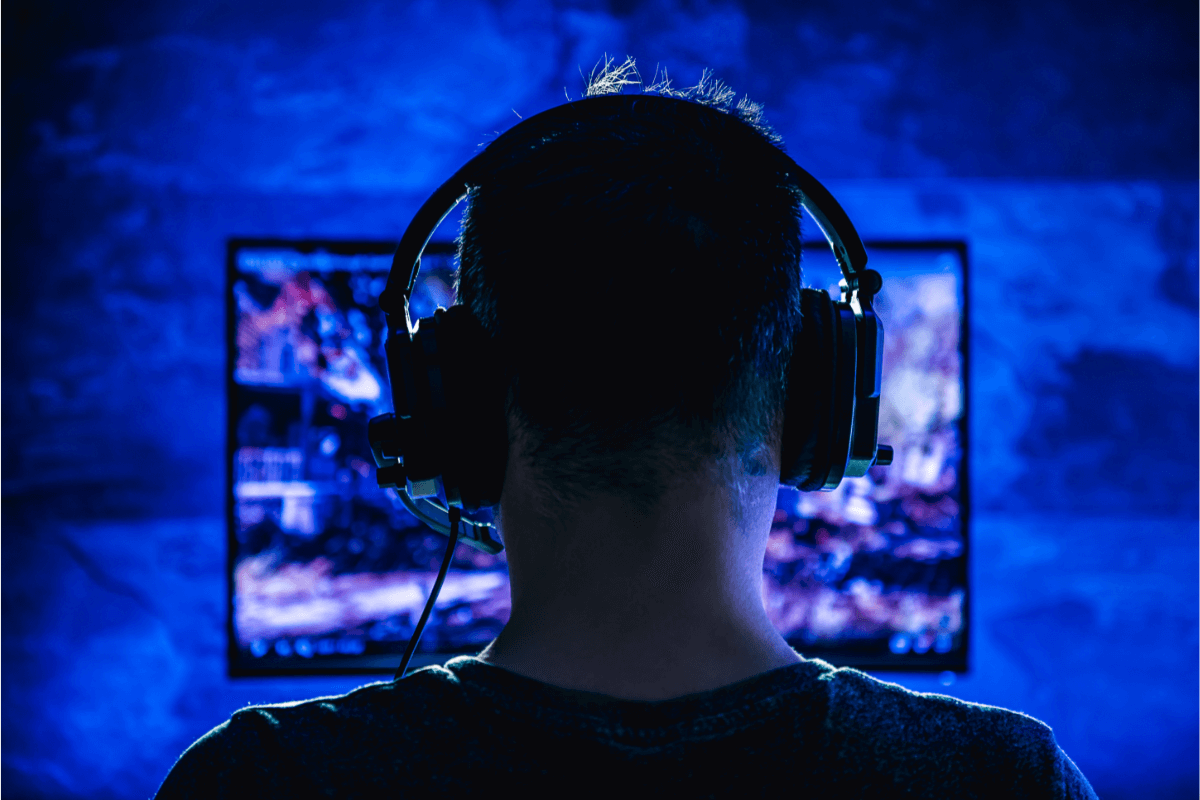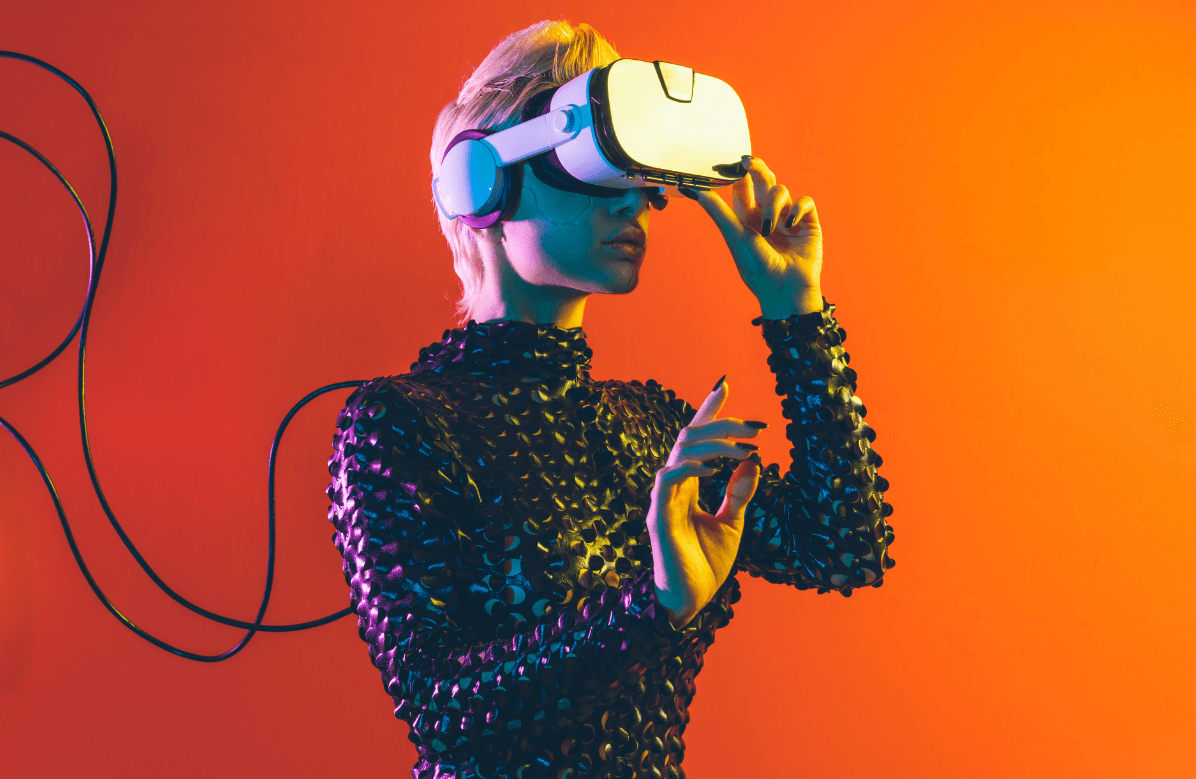AI in Entertainment: Top Use Cases, Benefits, and Everything In-Between

For quite some time, AI has been associated with automating routine tasks. Indeed, it’s one of the main use cases of AI in entertainment. Yet, AI has progressed and learned to perform more complex tasks like making decisions and predicting user behavior. After ChatGPT‘s success, AI has penetrated the field of creativity and mastered natural language understanding and original content generation.
Nowadays, AI in media and entertainment industry secured a firm foothold because it can handle three main profitability factors of the entertainment product. It can help you select the right distribution channel, improve the effectiveness of the advertising and sponsorships, and predict consumer demand with high precision. Artificial intelligence has infiltrated the entertainment industry like a digital John Wick – unstoppable and constantly upping the game. Mirroring its unstoppable rise, the market for AI in media is set to expand from $13.79 billion in 2023 to $17.65 billion in 2024.
from 25 countries outsourced software development to Relevant
We provide companies with senior tech talent and product development expertise to build world-class software.
But what is the real value of intelligent technology in media, and how is AI used in entertainment? Read on to discover insights from Relevant Software experts whose experience in AI software development for media and entertainment spans over a decade.
AI in Entertainment: From Simple Algorithms to Complex Creativity
AI is a decades-old technology that has passed through basic computational theories to advanced algorithms powering diverse applications we use today: smart chatbots, content creation tools, and many others. So, the technology’s timeline is long, but we’ll mention the most important milestones of AI in entertainment.

1950s-1980s: The birth and early stages of AI
Although not directly applied to entertainment, Alan Turing’s foundational work “Computing Machinery and Intelligence,” which introduces the Turing Test—a test of a machine’s capability to show intelligence—has laid the groundwork for the future exploration and development of AI. And so, the early experiments with computer-generated music and art were carried out in the 1970s. A bit later, video game developers started to incorporate basic AI to control non-player characters (NPCs) with the aim of enhancing gameplay and interactivity.
1990s-2000s: AI amasses momentum in gaming and digital effects
During this period, the film industry witnessed a major transformation due to AI-powered rendering and digital effects. “Jurassic Park” (1993) used AI to create some of the most realistic dinosaurs ever seen, blending animatronics and CGI. “Terminator 2: Judgment Day” (1991), “Toy Story” (1995), Titanic” (1997), “The Matrix” (1999) all leveraged artificial intelligence for complex digital effects. Similarly, the gaming world experienced advancements with AI-controlled characters that adapt to player actions, like the ones in “Half-Life” and “Grand Theft Auto.”

Source: Classicnerd
2000s-2010s: AI and personalization
In the early 2000s, recommendation algorithms, notably those developed by Netflix, personalized the way consumers discover movies and entertainment on a massive scale. Soon after, AI influenced music production, with artists and producers using software capable of composing music and improving sound quality. The late 2000s saw social media platforms join the AI wave as well and started to offer customized content feeds. One more notable advancement was the creation of voice-controlled AI assistants and smart speakers that allowed users to play music, adjust volume, and even search for content with simple voice commands.
2010s-Present: AI dominates the day-to-day
The 21st century saw AI in entertainment take a leap. Currently, artificial intelligence is advancing upon the foundational use cases laid out in the early 2000s. Thanks to breakthroughs in natural language processing, AI-driven solutions are now able to write screenplays and create original music pieces that mimic famous composers. The technology has reached the point when it has become the must-have tool for those who want to differentiate.
AI-Driven Content Creation
Entertainment companies now more often use AI to speed up different types of content creation and deliver a more immersive and personalized experience. So, let’s take a closer look at some examples of AI in entertainment and the ways it helps companies produce entertainment products faster yet with lower costs and without compromising on quality.
Music and Composition
One of the most exciting AI in entertainment examples that found widespread use is the generation of original musical compositions that are little indistinguishable from those created by humans. Tools like Amper Music let users create professional-quality tracks without any musical background. AIVA is another AI-driven software that has been largely used for producing music in movies and video games.

What’s more, when we add personalization to the music production field, we can get AI DJs that curate sets based on user preferences and energy levels at live events or music therapy experiences that cater to individual needs. As you can see, the possibilities of AI in entertainment and particularly the music sector, are truly thrilling.
Filmmaking and Video Production
AI has also established its presence in video and film production. Here, the technology that can perform audience analysis, predict the success of a movie, and generate human-like original content can assist filmmakers in more than one way:
- Scripts writing. Artificial intelligence can suggest plot twists, develop character arcs, and even write entire scripts, providing a rich starting point or a source of inspiration for writers facing creative blocks.
- Visual effects and CGI. AI has been widely used for quite some time to create computer-generated imagery (CGI) and animation visual effects. It turned out to be a more time- and cost-effective way of producing realistic simulations than using physical props and green screens.
- Movie editing. AI-assisted editing tools can scan hours of footage and identify the best moments, suggesting cuts and transitions to keep the story flowing seamlessly. Just imagine how many of the post-production tasks can be automated and how it can accelerate the editing process.
- Film production. Another creative area AI in media and entertainment has touched is actually the process of movie creation. Benjamin, a deep learning model, directed the 7-minute sci-fi movie in just 48 hours. Of course, it’s far from being an award-winning, yet the results are impressively encouraging. One more notable AI work is a trailer for the 20th Century Fox movie Morgan created by the IBM Watson supercomputer.
- Predictions of movie success. AI algorithms can analyze audience segments and other user data to identify elements that resonate with viewers – suspenseful cliffhangers, compelling character development, etc., to help filmmakers refine the script and increase the film’s commercial success. Warner Bros., for example, uses the Cynelytic AI tool to predict the box office performance of its films. Sony Pictures employs ScriptBook to forecast the potential revenue of 62 of its films.
Writing and Literature
At the moment, AI in entertainment can’t beat human creativity, doubly so replace it. Many writers and content creators see ChatGPT and similar AI tools as valuable brainstorming partners that can break writer’s block and give ideas for the next chapter, storyline, or catchy headline. Many story-writing tools offer separate functionality for plot building, outline generation, or headline ideas, which can accelerate writing several times.
Personalization and Recommendation Engines
Well, personalization is one of the main superpowers of AI in the entertainment industry. Today, each good enough music, video, or content recommendation system uses artificial intelligence to offer customized suggestions. So, it makes sense to understand the mechanics behind recommendation engines and probably give a try to create an AI system on your own.
So, the first thing these systems need to work properly is data. Every movie a user watches, every song they skip, every book they abandon – it all adds to the data pool, which AI analyzes to create a profile of user tastes and preferences.
Then, recommendation engines can use two common tactics: 1) collaborative filtering, where AI identifies users with similar tastes and recommends content they’ve enjoyed, or 2) content-based filtering, where AI figures out the characteristics of the content the user has enjoyed in the past – genre, actors, directors – and recommends similar items. More advanced systems can also consider contexts like time of the day or weather to suggest relevant content and learn from each user interaction with the specific content to offer more personalized recommendations.
Streaming Services and Content Discovery
Netflix, YouTube, and Amazon Prime are big names, well-known for their successful use of AI in entertainment to offer personalized content recommendations based on user viewing habits. Easier discovery of relevant content is among other important AI use cases in media and entertainment that considerably increased the amount of content consumed. For example, Netflix’s algorithm analyzes over 200 million hours of user data daily, resulting in approximately 80% of content being discovered through recommendations.

Interactive and Personalized Advertising
Streaming platforms were the first to earn considerable profits through subscription models and targeted ad campaigns. The key advantages of AI-based advertising are machine learning capabilities and big data analytics, which help you make detailed analyses of consumer behavior, check it against historical data, and improve user experience accordingly.
AI in entertainment also lets marketers monitor the effectiveness of their strategies and optimize them to reach the best results. So, it’s not surprising big media entertainment companies like Disney+ use AI solutions for targeted advertising to offer more relevant ads that better resonate with their subscribers.
AI in Game Development and Virtual Worlds
Gaming has also been upgraded thanks to artificial intelligence. Let’s understand how exactly.

Creating Dynamic Game Environments
Ubisoft, a titan in the video game industry, taps into AI for something called procedural content generation (PCG). PCG algorithms use machine learning to examine textures, maps, and gameplay mechanics and produce diverse game content on its own. With the help of PCG tools companies can follow the example of Ubisoft and design large game worlds with extremely realistic landscapes and full of interactive elements much faster and with less manual effort. In this case, AI in entertainment and media automates rather creative tasks and does it exceptionally well.
NPC Behavior and Complexity
Non-player characters (NPCs) are an indispensable part of gaming that enriches the story and environment. From primitive lifeless bots, NPCs turned into responsive and adaptive virtual characters that can react to player’s actions. Thus, NPCs from Witcher 3: Wild Hunt demonstrate how this single change to NPCs made the game feel more immersive, personalized, and real.
Even more, modern AI in entertainment solutions used to power NPCs can anticipate gamers’ next moves by looking at their past behavior. In a nutshell, AI’s role in video games boils down to making the not-so-realistic gaming world more vibrant and vivid.
Virtual Reality (VR) and Augmented Reality (AR) in Entertainment
VR and AR are growing in popularity due to two reasons: more affordable headsets and equipment and an increasing volume of AR and VR content, with AI in entertainment industry being the major enabler.

Enhancing Immersive Experiences
It’s all about the details. Artificial intelligence simulates the way light bounces off surfaces, how objects move and interact, and the textures with precision and realism that tricks our brains into believing we’re somewhere else. Being the key technology behind digital twins that can replicate real-world objects, AI applies the rules of physics to create virtual environments where everything feels right.
That’s why you can lose yourself in VR and AR spaces, feeling fully present in a world crafted by lines of code but feeling as tangible as the one we live in. These capabilities of AI in entertainment open possibilities for more convincing games, educational tools, and remote social interactions. A practical example is virtual glasses try-on, where AR and AI let users preview eyewear in real time while turning a standard shopping journey into an immersive, almost game-like experience.
Interactive Storytelling and Performances
The concept of interactive storytelling is relatively new, and the role of AI in entertainment in this domain is key. One of the episodes of the Netflix series Black Mirror – “Bandersnatch,” has vividly demonstrated how it works. So, after the beginning of the story, the middle unfolds with multiple narrative branches or options that lead to different endings based on user choice.
Since this technique can create personalized narrative experiences for each user and boost interaction, many VR/AR contents incorporate it. Today, consumers can enjoy VR games where every choice they make influences the outcome of the story or an AR performance that shifts based on user location in the real world. There are VR theaters where characters react to the audience’s reactions and change their performance to match the mood and engagement level of the viewer. All this is made possible by AI’s ability to process user inputs and environmental factors to help the system respond accordingly.
AI in Entertainment: Summary
As you can see, the role of AI in entertainment is nothing short of transformative. The rise of generative AI tools has sparked a genuine interest in Hollywood and industry leaders as they offer creative potential, content customization, efficiency, and so much more. Relevant Software experts have come to the conclusion that the future of AI in entertainment is bright and full of unlimited possibilities.
If you’re ready to join the ranks of successful companies alongside Netflix and Spotify, you should realize that proper AI implementation and use is key. By hiring our AI engineers, you’ll get the expertise needed to navigate your next AI project. Building media and entertainment solutions for over a decade, our specialists are well aware of the common problems companies face and will help you find the best way to resolve them through effective AI deployment.


Hand-selected developers to fit your needs at scale! Let’s build a first-class custom product together.

